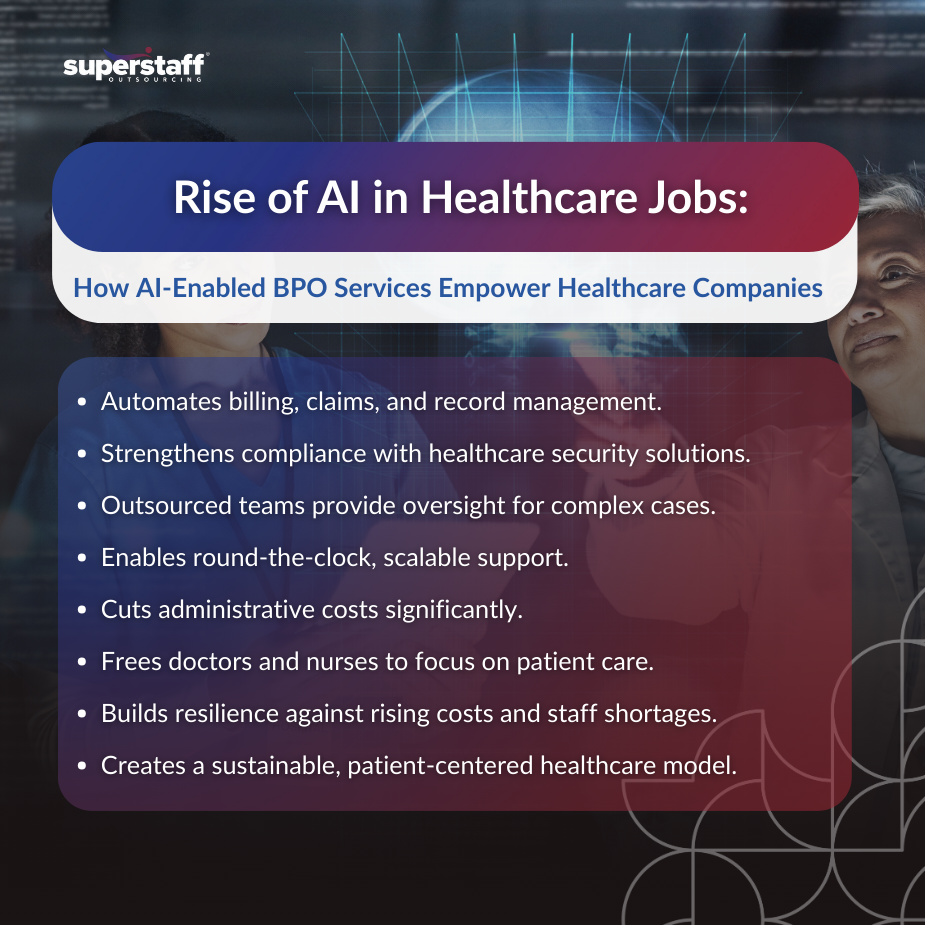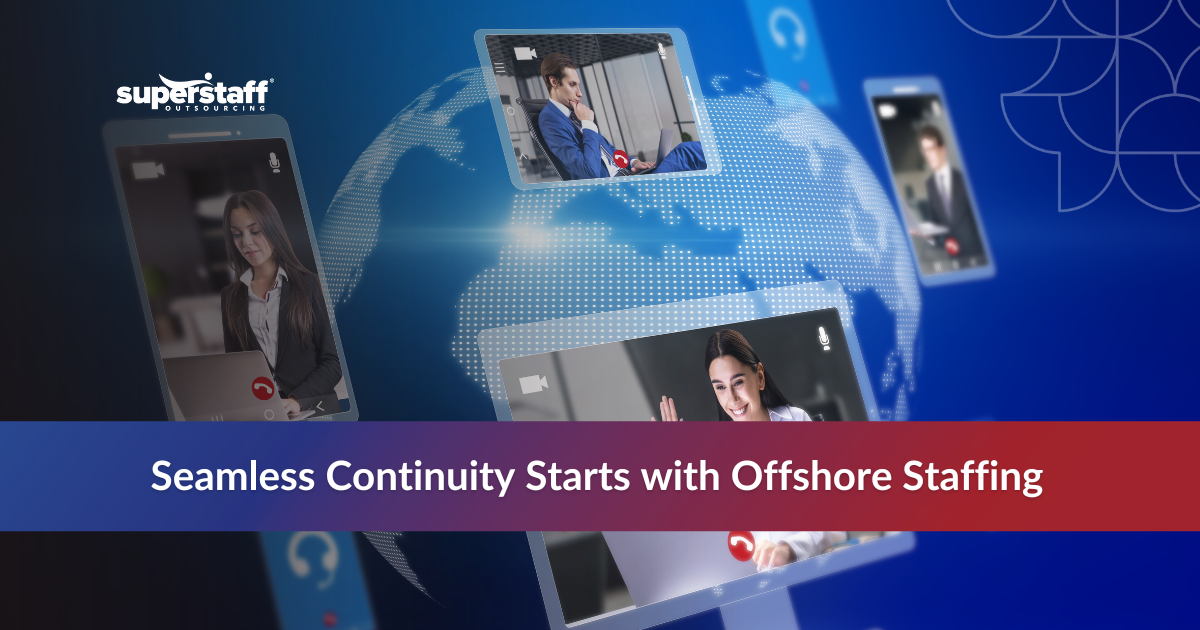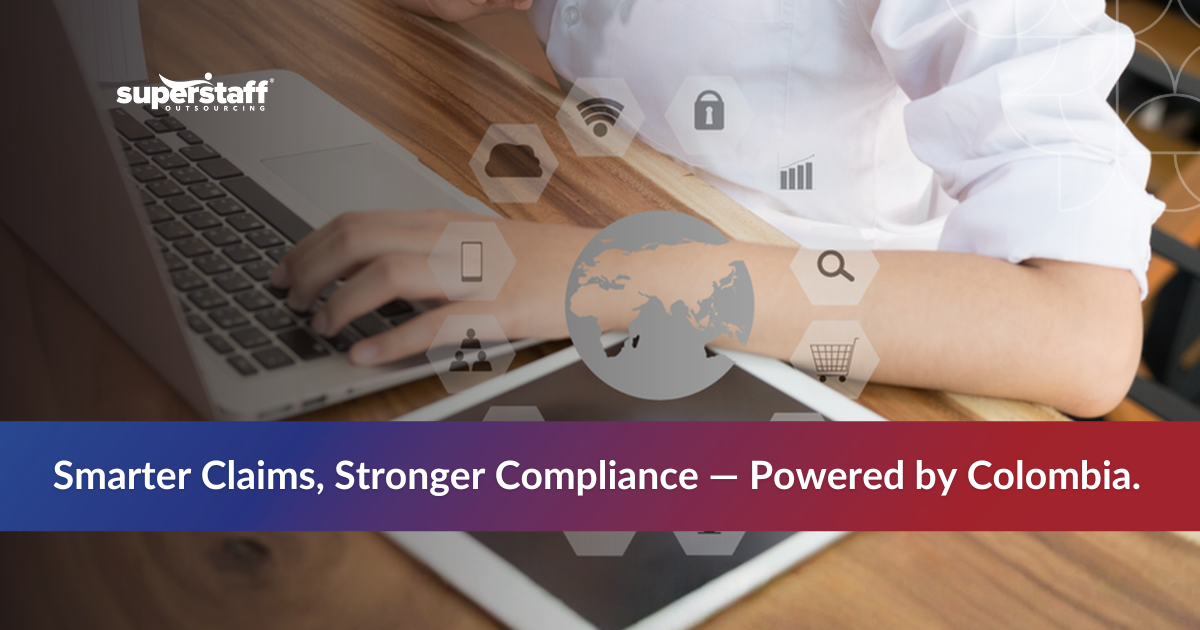
The healthcare industry is drowning in paperwork and administrative burdens. From processing medical claims to managing patient records, hospitals and clinics are devoting enormous amounts of time and resources to tasks that take professionals away from their true calling: patient care. These inefficiencies come at a steep cost—driving up expenses, slowing down operations, and fueling widespread staff burnout across the medical field.
This is where the rise of AI in healthcare jobs intersects with the strategic role of outsourcing. By automating repetitive tasks, AI reduces errors and accelerates processes, while outsourced teams provide the human expertise to oversee, manage, and handle the complexities that machines alone cannot resolve. Together, this combination doesn’t just lighten the load—it creates a sustainable model that redefines how administrative work gets done in healthcare.
In today’s environment of rising costs, stricter regulations, and persistent workforce shortages, outsourcing powered by AI is no longer just a cost-cutting measure. It’s a necessary evolution, giving healthcare organizations the tools and teams they need to simplify administration, protect staff well-being, and refocus resources on what matters most: delivering high-quality care to patients.
Administrative tasks consume a disproportionate share of healthcare resources
Administrative functions in healthcare are massive, complex, and costly. Studies consistently show that healthcare organizations spend billions annually on back-office processes such as billing, claims verification, compliance reporting, and medical record management. This is why more medical institutions are realizing the value of AI in healthcare jobs through strategic offshoring.
Manual processes slow down patient care
Most billing and claims tasks still rely on manual entry and verification, which delays reimbursements and clogs patient pipelines. Nurses and doctors often spend hours filling out forms or correcting errors rather than focusing on treatment.
The cost impact of inefficiencies
Every error in claims filing can cost thousands of dollars and lead to long delays in payment. Inefficient medical recordkeeping not only slows workflows but also creates risks for compliance violations. These costs add up, eating into margins for both hospitals and private practices.
Rising pressure from insurers and regulators
Healthcare providers face increasing scrutiny from insurers and regulators. Every claim must meet strict coding requirements, and every record must comply with privacy standards like HIPAA. Meeting these requirements manually places enormous pressure on already overworked staff.
These challenges are no longer sustainable, creating the need for scalable, intelligent solutions that combine technology with human expertise.

AI is transforming healthcare administration with automation and predictive tools
Artificial intelligence has made rapid inroads into healthcare administration, bringing efficiency to once time-consuming tasks. With the rise of AI in healthcare jobs, more medical institutions are streamlining their operations while retaining quality patient care.
Practical applications in administration
- Natural language processing (NLP): AI systems convert doctors’ notes into structured, usable medical records.
- Claims automation: AI validates and submits claims quickly, reducing error rates.
- Fraud detection: Algorithms analyze patterns in billing to flag suspicious activity before it becomes a compliance issue.
Real-world examples of AI reducing errors
Hospitals using AI-assisted claims filing have seen reductions in rejections by up to 30%. Similarly, AI-driven coding tools help medical staff apply accurate billing codes, lowering the risk of denied reimbursements.
Predictive analytics streamline resource allocation
AI tools forecast patient demand and resource needs, ensuring that staff, supplies, and billing systems are aligned. This reduces bottlenecks, improves scheduling, and prevents over- or under-staffing.
Benefits of automation for compliance and reporting
With healthcare security solutions AI, providers can automate data privacy checks and ensure compliance with local and international standards. AI strengthens reporting accuracy, improves audit readiness, and protects sensitive patient information from breaches.
Yet AI cannot work in isolation—human support remains critical to oversee exceptions, manage relationships, and ensure that the system adapts to real-world complexities.
Healthcare outsourcing provides the skilled workforce to complement AI systems
Outsourcing has long been a solution for administrative overload, and the rise of AI in healthcare jobs makes it even more effective. Offshore business process outsourcing (BPO) providers, particularly in the Philippines, supply the expertise and workforce to complement AI tools.
Cost-effectiveness and round-the-clock support
When you outsource to the Philippines, you access highly trained professionals at a fraction of the cost of local staff. With time zone advantages, providers can deliver 24/7 support to handle billing, claims, and record management, ensuring seamless operations even during peak hours.
Scalability during peak demand
Outsourcing allows healthcare organizations to scale quickly during seasonal surges, pandemics, or regulatory changes. Providers can ramp up or scale down teams as needed, without the costs and risks of hiring in-house staff.
Cultural and process alignment for accuracy
Filipino BPO professionals are known for strong cultural compatibility with U.S. healthcare systems. They undergo rigorous training in HIPAA compliance, coding, and administrative workflows, ensuring accuracy and efficiency.
When outsourcing is combined with AI technologies, the result is a multiplier effect that reduces complexity and enhances operational capacity.
The synergy of AI + outsourcing reduces administrative complexities at scale
Neither AI nor outsourcing alone can fully solve the administrative crisis in healthcare. But when integrated, the combination delivers powerful results. For this reason, many companies seek BPO providers that offer AI in healthcare jobs.
Human oversight improves machine-driven processes
AI can process data at speed, but humans are needed to review, interpret, and resolve anomalies. Outsourced teams provide this critical oversight, ensuring accuracy and preventing costly errors.
Offshore teams handle exceptions and complex cases AI can’t
Not every claim or record fits a pattern. Complex cases require judgment, context, and empathy—qualities AI lacks. BPO teams in the Philippines step in to manage these exceptions seamlessly.
Together, they cut costs while improving compliance
By pairing AI’s efficiency with outsourcing’s expertise, healthcare organizations save significantly on operational costs. More importantly, compliance improves, thanks to human oversight supported by automated fraud detection and reporting tools.
This combination doesn’t just benefit the business—it directly enhances the patient experience.
Patients experience improved care when administrative burdens are minimized
The ultimate goal of reducing administrative complexity is to improve patient outcomes and satisfaction.
Faster claims mean less stress for patients
With AI in healthcare jobs and outsourced support teams, claims are processed quickly and accurately. Patients avoid delays in insurance approvals and billing disputes, leading to smoother care experiences.
More time for doctors and nurses to focus on treatment
When back-office tasks are streamlined, medical staff can redirect their attention to patient care. Physicians spend less time buried in paperwork and more time at the bedside.
Enhanced trust through reduced billing errors
Billing mistakes erode trust between providers and patients. With AI-driven automation and trained offshore teams, errors are minimized, boosting patient confidence and satisfaction.
For healthcare leaders, these improvements underscore why AI-powered outsourcing is not just a trend; it’s a future-proof strategy.
Embracing AI-powered outsourcing secures long-term sustainability in healthcare
The challenges facing healthcare, such as rising costs, staff shortages, and stricter regulations, are not going away. To remain sustainable, organizations must embrace innovative models that combine technology and global talent.
AI + outsourcing builds resilience against future challenges
From pandemics to policy changes, healthcare systems must adapt quickly. AI provides the tools for rapid adjustments, while outsourcing offers the workforce flexibility to scale as needed.
Enables healthcare organizations to scale without compromising quality
As demand for healthcare services grows, outsourcing ensures organizations can expand their administrative capacity without overloading staff or sacrificing accuracy.
Sets a competitive edge in patient-centered care
Hospitals and clinics that adopt AI in healthcare jobs alongside outsourcing not only reduce costs but also create a smoother, more reliable patient journey. This differentiates them in a highly competitive healthcare market.
Taken together, these outcomes point toward one clear conclusion: the future of healthcare administration lies in the synergy of AI and outsourcing.
Seeking AI in Healthcare Jobs? Turn to SuperStaff!
The convergence of AI and healthcare outsourcing creates a powerful model for reducing administrative complexities. By blending automation with offshore expertise, providers gain the ability to cut costs, streamline compliance, and free staff from the heavy burdens of paperwork. The benefits of outsourcing healthcare administration extend beyond efficiency—they directly translate into better patient outcomes, improved staff well-being, and stronger organizational resilience.
For healthcare leaders, the path forward is clear. Partnering with trusted outsourcing providers that leverage AI is not merely a cost-saving strategy; it is a necessary evolution in a medical industry that demands efficiency, security, and patient-centered care. Now is the time to embrace AI-powered outsourcing and position your organization for sustainable success.
Ready to outsource to the Philippines? Get in touch with SuperStaff for comprehensive healthcare BPO solutions.






